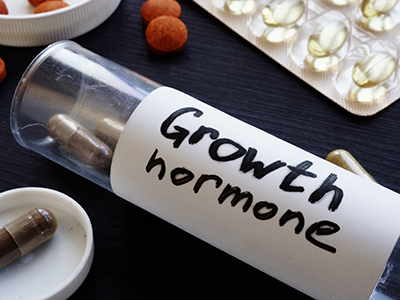Although thyroid problems are often associated with adults, children can have them too. In fact, thyroid problems are the most common endocrine disorder in school-aged children. We asked Priya Vaidyanathan, MD, an endocrinologist at Children’s National Hospital, about common thyroid problems in children and how they are treated.
What are some common thyroid problems in children?
The thyroid gland is a butterfly shaped gland located in the middle of the neck. It produces the thyroid hormones T4 (thyroxine) and T3 (triiodothyronine) which regulate growth and metabolism. Thyroid hormone production is controlled by another hormone called thyroid stimulating hormone (TSH) which comes from the pituitary gland in the brain.
Two common thyroid problems seen in children are hypothyroidism — a decrease in production of thyroid hormones — and hyperthyroidism — an excess production of thyroid hormones. Hypothyroidism can be present at birth or occur later in childhood. When present at birth It is called congenital hypothyroidism and when diagnosed later in childhood it is called acquired hypothyroidism.
How is congenial hypothyroidism diagnosed?
Congenital hypothyroidism occurs in one in 4,000 newborn babies and can be due to the thyroid gland forming improperly or being in the wrong part of the neck. Most newborns have no symptoms of congenial hypothyroidism which is why we rely on the newborn screen to make the diagnosis. A drop of blood is collected from the heel of a newborn baby before discharge from the hospital and sent to a lab to test for congenital hypothyroidism. A high TSH value and a low T4 value is indicative of congenital hypothyroidism. This is reported to the primary doctor who will refer the baby to a pediatric endocrinologist for further management. Thyroid hormone levels will be checked again to confirm the high TSH and low T4 or Free T4 (Free T4 is another way to measure the thyroid hormone) before starting treatment.
How is acquired hypothyroidism diagnosed?
Hypothyroidism can be acquired anytime in childhood or adulthood and is quite common. It is often due to direct attack of the thyroid gland by the immune system. This process is called autoimmune thyroiditis or Hashimoto disease. Other causes are damage to the thyroid gland from cancer radiation or surgery to remove the thyroid gland. Rarely, hypothyroidism can be due to pituitary damage.
Symptoms of hypothyroidism in children include tiredness, constipation, poor growth, feeling unusually cold and or dry skin. The thyroid gland may or may not be enlarged. When hypothyroidism is suspected, a blood test for TSH, T4 or Free T4 is performed. High TSH and low Free T4 confirm the diagnosis of primary hypothyroidism caused by to the thyroid gland. In autoimmune thyroiditis, thyroid antibody levels are high. If there is pituitary damage, the TSH levels are low or normal while the Free T4 is low.
How is hypothyroidism treated?
Congenital hypothyroidism is treated with thyroid hormone called Levothyroxine. It is only available as a pill. It should be crushed and dissolved in a small amount of water, formula or breast milk and given once a day using a syringe. Starting treatment by 2-3 weeks of life and close monitoring by a pediatric endocrinologist allows for normal growth and development.
Acquired hypothyroidism is also treated with Levothyroxine once a day in the morning on an empty stomach with water. TSH and Free T4 are checked 6-8 weeks (about 2 months) after starting treatment and thereafter every 3-12 months at the advice of the pediatric endocrinologist. Mild TSH increase with normal Free T4 can be monitored without starting treatment right away.
Most congenital and acquired hypothyroidism need lifelong therapy.
How is hyperthyroidism diagnosed?
Hyperthyroidism is due to overactive thyroid gland and is often due to the immune system stimulating the thyroid gland to make too much thyroid hormone. This is also known as Graves’ disease. There are several symptoms, like rapid heart rate or palpitations, weight loss, diarrhea, feeling hot, hyperactivity, inability to fall asleep, tremors and poor school performance. The thyroid gland is often enlarged and there may be bulging of the eyes. The diagnosis is made by blood tests showing a high Free T4 and T3 along with an extremely low TSH.
How is hyperthyroidism treated?
The first line of treatment is with a medication called Methimazole given 1-2 times a day. Treatment is continued for several years based on the response, and 50% of children can stop treatment within 6-8 years as thyroid levels have normalized by then. Side effects include rash, increase in liver enzymes and low blood count. In some cases, radioactive iodine therapy or removing the thyroid gland may be necessary. After these treatments, the individual becomes hypothyroid and must take levothyroxine lifelong.
Are there any symptoms of thyroid problems parents should look out for?
You should see your pediatrician and get your child’s thyroid hormone levels checked if:
- You notice a swelling in the front of neck which could be thyroid enlargement.
- You notice any of these hypothyroid symptoms
- Fatigue
- Poor growth
- Feeling unusually cold
- Constipation,
- Dry skin
- Hair loss
- Menstrual irregularity
- You notice any of these hyperthyroid symptoms
- Unexplained weight loss
- Rapid heart rate
- Feeling hot all the time
- Diarrhea
- Inability to focus/sudden decrease in school performance
- Restlessness
- Tremors
- Bulging of eyes
Based on the thyroid levels, your pediatrician will determine if your child should see a pediatric endocrinologist.
 https://riseandshine.childrensnational.org/wp-content/uploads/2023/03/doctor-examining-boys-thyroid-feature.png
300
400
Rise and Shine
https://riseandshine.childrensnational.org/wp-content/uploads/2017/11/childrens_riseandshine_logo.jpg
Rise and Shine2023-03-30 10:47:122023-03-30 11:44:51Can children have thyroid problems?
https://riseandshine.childrensnational.org/wp-content/uploads/2023/03/doctor-examining-boys-thyroid-feature.png
300
400
Rise and Shine
https://riseandshine.childrensnational.org/wp-content/uploads/2017/11/childrens_riseandshine_logo.jpg
Rise and Shine2023-03-30 10:47:122023-03-30 11:44:51Can children have thyroid problems?




Leave a Comment
Want to join the discussion?Feel free to contribute!